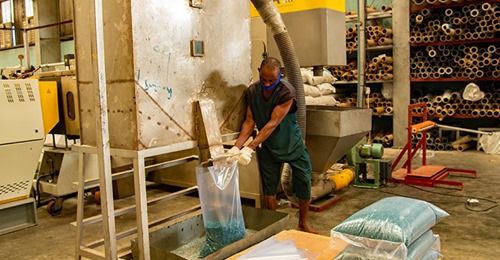Packaging solutions provider Dow recently signed a partnership with Norway-based digital platform Empower to conduct a feasibility study for a plastic waste recycling project in Nigeria. The aim of the project, part funded by the Norwegian Agency for Development Cooperation (Norad), is to accelerate plastics circularity in the country.
Packaging solutions provider Dow is making progress towards its goal of collecting and recycling one million tonnes of plastics worldwide by 2030. In Nigeria, the company plans to collect and recycle a total of 300 million plastic bags under its ReflexNG project. Dow’s aim is to establish a circular economy for plastics in Nigeria.
In order to reduce its environmental impact, the plastics producer recently signed a partnership with Empower. The digital platform, which specialises in the collection, tracking and recycling of plastics, will work with Dow to implement a scalable digital business model for waste collection and recycling in Nigeria. The system “will ensure transparency and reliability in the process of tracking recyclable plastic waste and converting it into new sustainable packaging,” says Empower. The company founded and led by Wilhelm Myrer uses blockchain technology to track and monetise plastic waste.
Sustainable plastic sourcing
“To achieve full plastic circularity, i.e. where the practical benefits match its environmental performance, we need each part of the value chain to work collectively. This new study will help us to better assess the feasibility and traceability of plastic waste in Nigeria,” says Adwoa Coleman, Dow’s head of sustainability and advocacy for Africa.
Read Also
The findings of the new study will, for example, help scale up Dow’s ReflexNG project, launched in 2020 in partnership with Omnik and RecylePoints. The study, part funded by the Norwegian Agency for Development Cooperation (Norad), will also support more sustainable plastic packaging manufacturing in Nigeria. According to the Nigerian authorities, the country generates some 32 million tonnes of waste per year (2.5 million tonnes of plastic waste), most of which (70%) ends up in landfills, sewers, beaches and water bodies.
Inès Magoum






